An Analysis of Entrepreneurial Ventures and Small Business Report
VerifiedAdded on 2020/07/22
|16
|4715
|64
Report
AI Summary
This report provides a detailed analysis of entrepreneurial ventures and small business management. It begins with an introduction to entrepreneurship, defining its core concepts and importance. The report delves into various types of entrepreneurial ventures, including small business entrepreneurship and scalable startups, and examines their relationship to different typologies like survival ventures and managed growth ventures. It also explores the similarities and differences between large and small-scale ventures, as well as private and joint ventures. The report then assesses the impact of micro factors and small businesses on the economy, highlighting their local and regional impacts. Furthermore, it discusses the significance of startups and small businesses in fostering economic growth. The report also defines the characteristics, skills, and traits of successful entrepreneurs and explores how these characteristics reflect entrepreneurial motivation and mindset. Finally, the report considers the background and experiences that may hinder entrepreneurship, concluding with a summary of key findings.

Entrepreneurship and
Small Business
Management
Small Business
Management
Paraphrase This Document
Need a fresh take? Get an instant paraphrase of this document with our AI Paraphraser
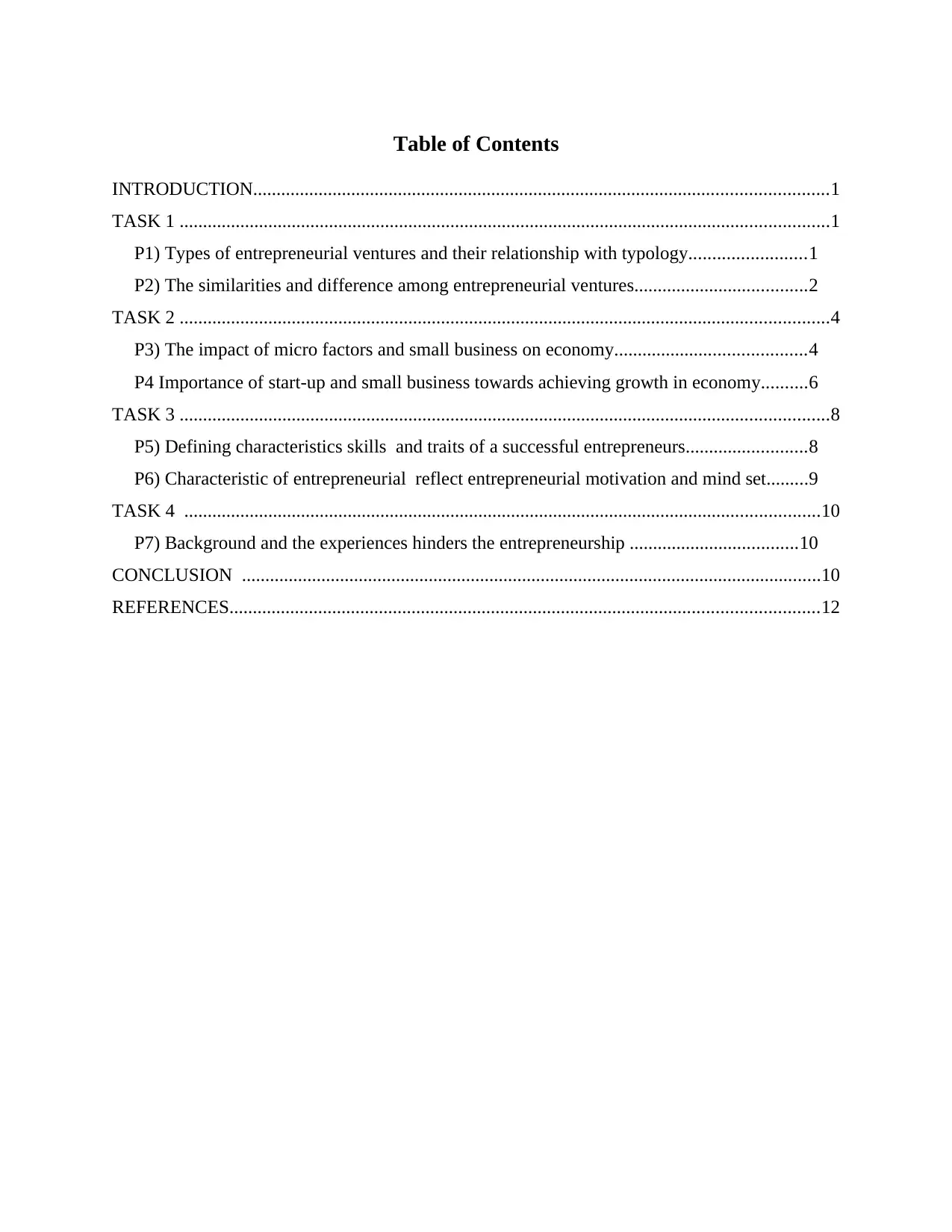
Table of Contents
INTRODUCTION...........................................................................................................................1
TASK 1 ...........................................................................................................................................1
P1) Types of entrepreneurial ventures and their relationship with typology.........................1
P2) The similarities and difference among entrepreneurial ventures.....................................2
TASK 2 ...........................................................................................................................................4
P3) The impact of micro factors and small business on economy.........................................4
P4 Importance of start-up and small business towards achieving growth in economy..........6
TASK 3 ...........................................................................................................................................8
P5) Defining characteristics skills and traits of a successful entrepreneurs..........................8
P6) Characteristic of entrepreneurial reflect entrepreneurial motivation and mind set.........9
TASK 4 ........................................................................................................................................10
P7) Background and the experiences hinders the entrepreneurship ....................................10
CONCLUSION ............................................................................................................................10
REFERENCES..............................................................................................................................12
INTRODUCTION...........................................................................................................................1
TASK 1 ...........................................................................................................................................1
P1) Types of entrepreneurial ventures and their relationship with typology.........................1
P2) The similarities and difference among entrepreneurial ventures.....................................2
TASK 2 ...........................................................................................................................................4
P3) The impact of micro factors and small business on economy.........................................4
P4 Importance of start-up and small business towards achieving growth in economy..........6
TASK 3 ...........................................................................................................................................8
P5) Defining characteristics skills and traits of a successful entrepreneurs..........................8
P6) Characteristic of entrepreneurial reflect entrepreneurial motivation and mind set.........9
TASK 4 ........................................................................................................................................10
P7) Background and the experiences hinders the entrepreneurship ....................................10
CONCLUSION ............................................................................................................................10
REFERENCES..............................................................................................................................12

⊘ This is a preview!⊘
Do you want full access?
Subscribe today to unlock all pages.

Trusted by 1+ million students worldwide
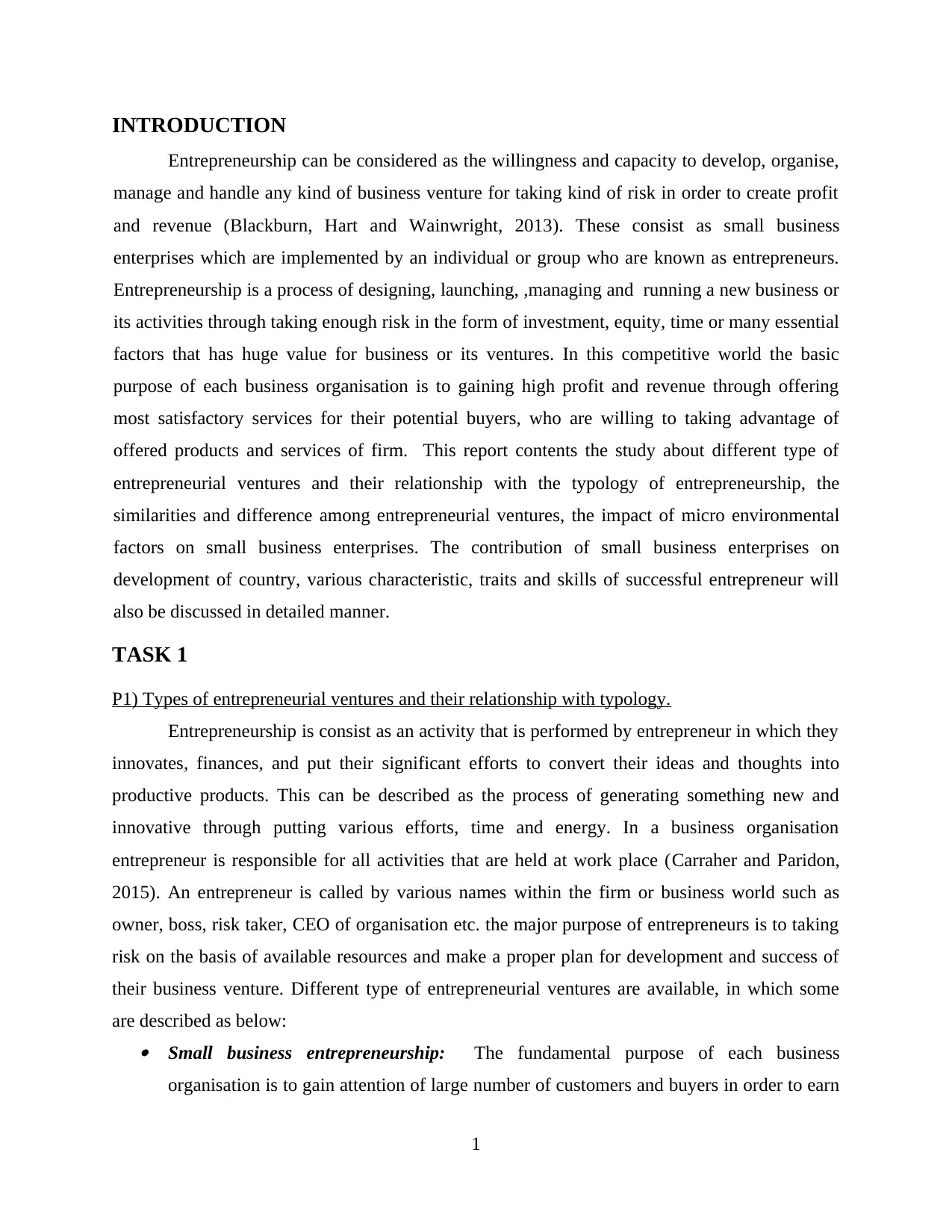
INTRODUCTION
Entrepreneurship can be considered as the willingness and capacity to develop, organise,
manage and handle any kind of business venture for taking kind of risk in order to create profit
and revenue (Blackburn, Hart and Wainwright, 2013). These consist as small business
enterprises which are implemented by an individual or group who are known as entrepreneurs.
Entrepreneurship is a process of designing, launching, ,managing and running a new business or
its activities through taking enough risk in the form of investment, equity, time or many essential
factors that has huge value for business or its ventures. In this competitive world the basic
purpose of each business organisation is to gaining high profit and revenue through offering
most satisfactory services for their potential buyers, who are willing to taking advantage of
offered products and services of firm. This report contents the study about different type of
entrepreneurial ventures and their relationship with the typology of entrepreneurship, the
similarities and difference among entrepreneurial ventures, the impact of micro environmental
factors on small business enterprises. The contribution of small business enterprises on
development of country, various characteristic, traits and skills of successful entrepreneur will
also be discussed in detailed manner.
TASK 1
P1) Types of entrepreneurial ventures and their relationship with typology.
Entrepreneurship is consist as an activity that is performed by entrepreneur in which they
innovates, finances, and put their significant efforts to convert their ideas and thoughts into
productive products. This can be described as the process of generating something new and
innovative through putting various efforts, time and energy. In a business organisation
entrepreneur is responsible for all activities that are held at work place (Carraher and Paridon,
2015). An entrepreneur is called by various names within the firm or business world such as
owner, boss, risk taker, CEO of organisation etc. the major purpose of entrepreneurs is to taking
risk on the basis of available resources and make a proper plan for development and success of
their business venture. Different type of entrepreneurial ventures are available, in which some
are described as below: Small business entrepreneurship: The fundamental purpose of each business
organisation is to gain attention of large number of customers and buyers in order to earn
1
Entrepreneurship can be considered as the willingness and capacity to develop, organise,
manage and handle any kind of business venture for taking kind of risk in order to create profit
and revenue (Blackburn, Hart and Wainwright, 2013). These consist as small business
enterprises which are implemented by an individual or group who are known as entrepreneurs.
Entrepreneurship is a process of designing, launching, ,managing and running a new business or
its activities through taking enough risk in the form of investment, equity, time or many essential
factors that has huge value for business or its ventures. In this competitive world the basic
purpose of each business organisation is to gaining high profit and revenue through offering
most satisfactory services for their potential buyers, who are willing to taking advantage of
offered products and services of firm. This report contents the study about different type of
entrepreneurial ventures and their relationship with the typology of entrepreneurship, the
similarities and difference among entrepreneurial ventures, the impact of micro environmental
factors on small business enterprises. The contribution of small business enterprises on
development of country, various characteristic, traits and skills of successful entrepreneur will
also be discussed in detailed manner.
TASK 1
P1) Types of entrepreneurial ventures and their relationship with typology.
Entrepreneurship is consist as an activity that is performed by entrepreneur in which they
innovates, finances, and put their significant efforts to convert their ideas and thoughts into
productive products. This can be described as the process of generating something new and
innovative through putting various efforts, time and energy. In a business organisation
entrepreneur is responsible for all activities that are held at work place (Carraher and Paridon,
2015). An entrepreneur is called by various names within the firm or business world such as
owner, boss, risk taker, CEO of organisation etc. the major purpose of entrepreneurs is to taking
risk on the basis of available resources and make a proper plan for development and success of
their business venture. Different type of entrepreneurial ventures are available, in which some
are described as below: Small business entrepreneurship: The fundamental purpose of each business
organisation is to gain attention of large number of customers and buyers in order to earn
1
Paraphrase This Document
Need a fresh take? Get an instant paraphrase of this document with our AI Paraphraser
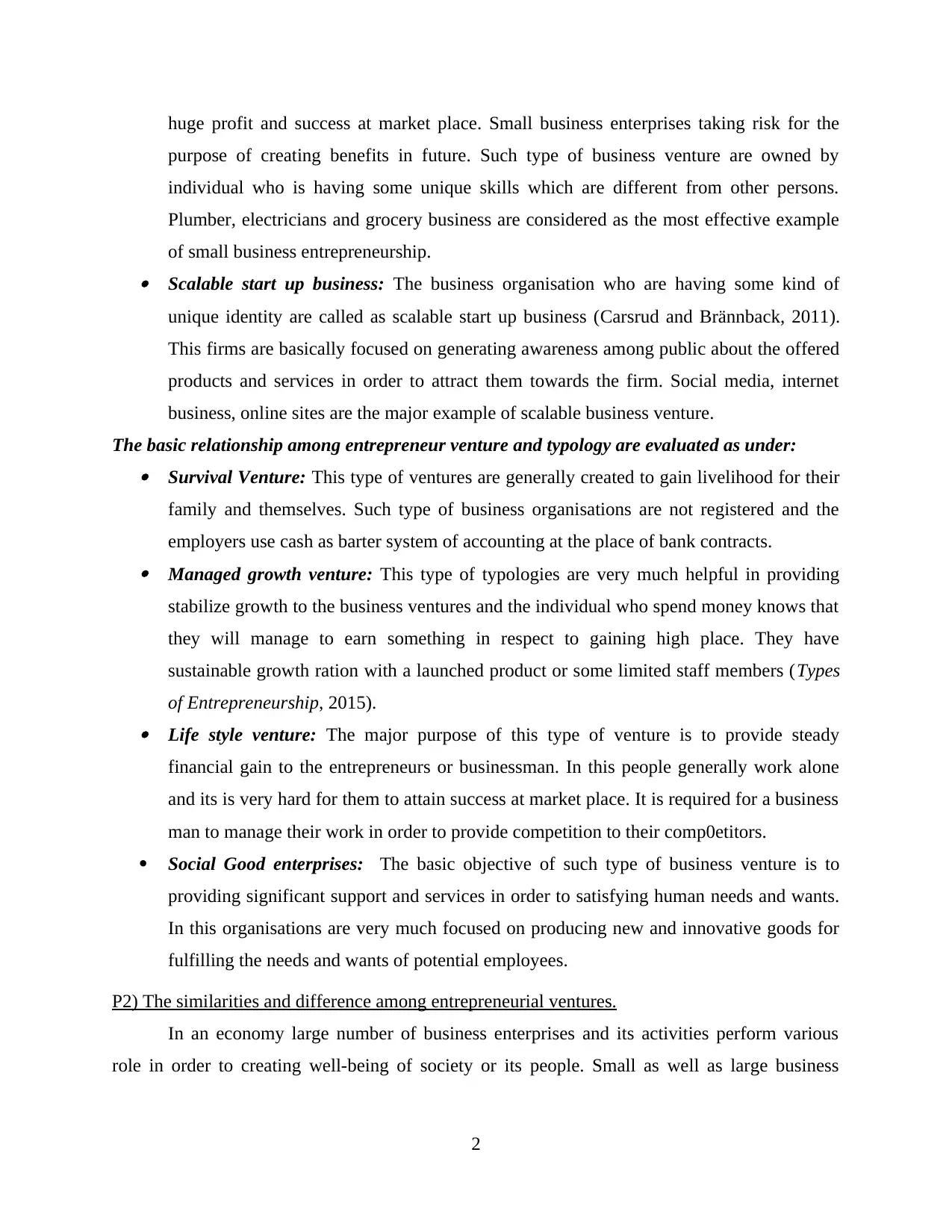
huge profit and success at market place. Small business enterprises taking risk for the
purpose of creating benefits in future. Such type of business venture are owned by
individual who is having some unique skills which are different from other persons.
Plumber, electricians and grocery business are considered as the most effective example
of small business entrepreneurship. Scalable start up business: The business organisation who are having some kind of
unique identity are called as scalable start up business (Carsrud and Brännback, 2011).
This firms are basically focused on generating awareness among public about the offered
products and services in order to attract them towards the firm. Social media, internet
business, online sites are the major example of scalable business venture.
The basic relationship among entrepreneur venture and typology are evaluated as under: Survival Venture: This type of ventures are generally created to gain livelihood for their
family and themselves. Such type of business organisations are not registered and the
employers use cash as barter system of accounting at the place of bank contracts. Managed growth venture: This type of typologies are very much helpful in providing
stabilize growth to the business ventures and the individual who spend money knows that
they will manage to earn something in respect to gaining high place. They have
sustainable growth ration with a launched product or some limited staff members (Types
of Entrepreneurship, 2015). Life style venture: The major purpose of this type of venture is to provide steady
financial gain to the entrepreneurs or businessman. In this people generally work alone
and its is very hard for them to attain success at market place. It is required for a business
man to manage their work in order to provide competition to their comp0etitors.
Social Good enterprises: The basic objective of such type of business venture is to
providing significant support and services in order to satisfying human needs and wants.
In this organisations are very much focused on producing new and innovative goods for
fulfilling the needs and wants of potential employees.
P2) The similarities and difference among entrepreneurial ventures.
In an economy large number of business enterprises and its activities perform various
role in order to creating well-being of society or its people. Small as well as large business
2
purpose of creating benefits in future. Such type of business venture are owned by
individual who is having some unique skills which are different from other persons.
Plumber, electricians and grocery business are considered as the most effective example
of small business entrepreneurship. Scalable start up business: The business organisation who are having some kind of
unique identity are called as scalable start up business (Carsrud and Brännback, 2011).
This firms are basically focused on generating awareness among public about the offered
products and services in order to attract them towards the firm. Social media, internet
business, online sites are the major example of scalable business venture.
The basic relationship among entrepreneur venture and typology are evaluated as under: Survival Venture: This type of ventures are generally created to gain livelihood for their
family and themselves. Such type of business organisations are not registered and the
employers use cash as barter system of accounting at the place of bank contracts. Managed growth venture: This type of typologies are very much helpful in providing
stabilize growth to the business ventures and the individual who spend money knows that
they will manage to earn something in respect to gaining high place. They have
sustainable growth ration with a launched product or some limited staff members (Types
of Entrepreneurship, 2015). Life style venture: The major purpose of this type of venture is to provide steady
financial gain to the entrepreneurs or businessman. In this people generally work alone
and its is very hard for them to attain success at market place. It is required for a business
man to manage their work in order to provide competition to their comp0etitors.
Social Good enterprises: The basic objective of such type of business venture is to
providing significant support and services in order to satisfying human needs and wants.
In this organisations are very much focused on producing new and innovative goods for
fulfilling the needs and wants of potential employees.
P2) The similarities and difference among entrepreneurial ventures.
In an economy large number of business enterprises and its activities perform various
role in order to creating well-being of society or its people. Small as well as large business
2
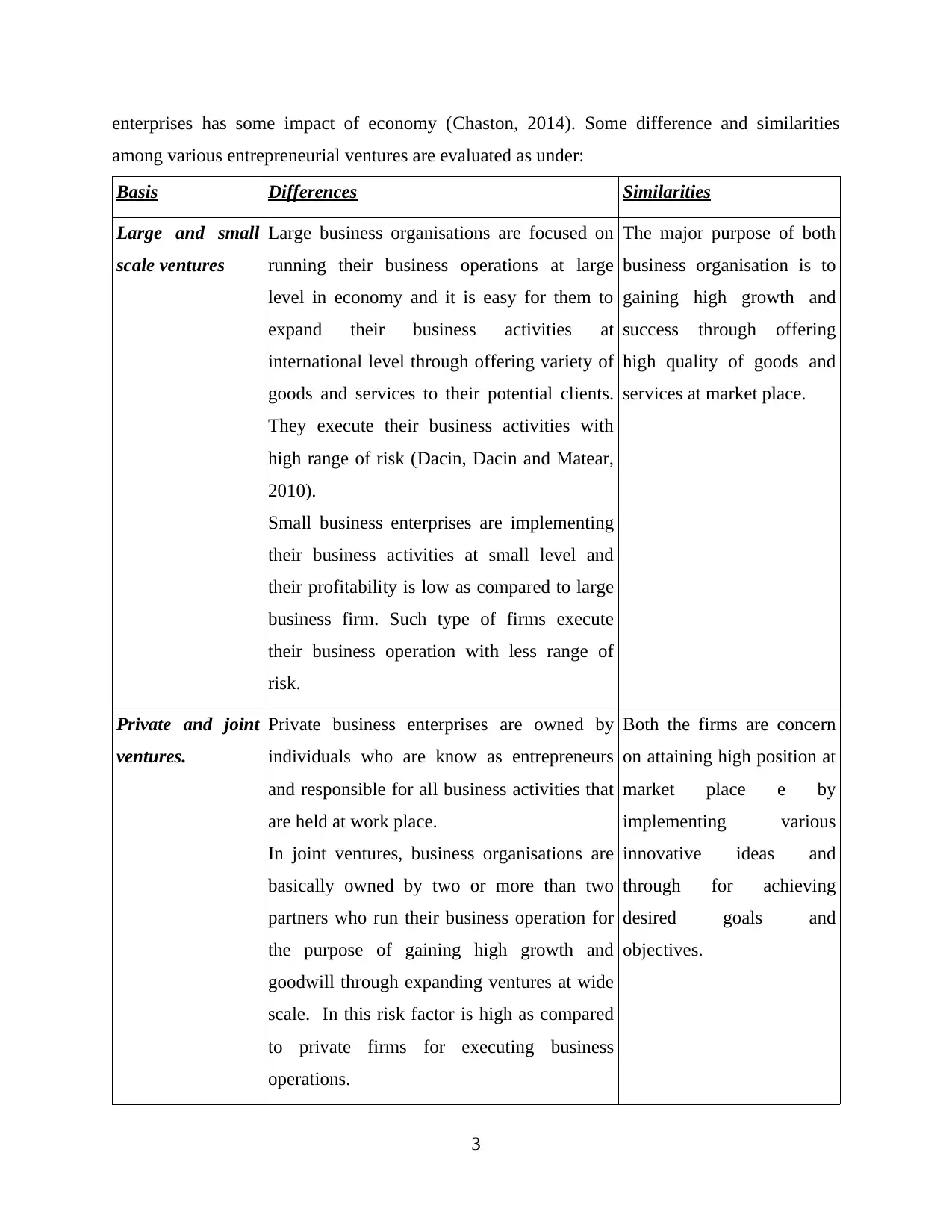
enterprises has some impact of economy (Chaston, 2014). Some difference and similarities
among various entrepreneurial ventures are evaluated as under:
Basis Differences Similarities
Large and small
scale ventures
Large business organisations are focused on
running their business operations at large
level in economy and it is easy for them to
expand their business activities at
international level through offering variety of
goods and services to their potential clients.
They execute their business activities with
high range of risk (Dacin, Dacin and Matear,
2010).
Small business enterprises are implementing
their business activities at small level and
their profitability is low as compared to large
business firm. Such type of firms execute
their business operation with less range of
risk.
The major purpose of both
business organisation is to
gaining high growth and
success through offering
high quality of goods and
services at market place.
Private and joint
ventures.
Private business enterprises are owned by
individuals who are know as entrepreneurs
and responsible for all business activities that
are held at work place.
In joint ventures, business organisations are
basically owned by two or more than two
partners who run their business operation for
the purpose of gaining high growth and
goodwill through expanding ventures at wide
scale. In this risk factor is high as compared
to private firms for executing business
operations.
Both the firms are concern
on attaining high position at
market place e by
implementing various
innovative ideas and
through for achieving
desired goals and
objectives.
3
among various entrepreneurial ventures are evaluated as under:
Basis Differences Similarities
Large and small
scale ventures
Large business organisations are focused on
running their business operations at large
level in economy and it is easy for them to
expand their business activities at
international level through offering variety of
goods and services to their potential clients.
They execute their business activities with
high range of risk (Dacin, Dacin and Matear,
2010).
Small business enterprises are implementing
their business activities at small level and
their profitability is low as compared to large
business firm. Such type of firms execute
their business operation with less range of
risk.
The major purpose of both
business organisation is to
gaining high growth and
success through offering
high quality of goods and
services at market place.
Private and joint
ventures.
Private business enterprises are owned by
individuals who are know as entrepreneurs
and responsible for all business activities that
are held at work place.
In joint ventures, business organisations are
basically owned by two or more than two
partners who run their business operation for
the purpose of gaining high growth and
goodwill through expanding ventures at wide
scale. In this risk factor is high as compared
to private firms for executing business
operations.
Both the firms are concern
on attaining high position at
market place e by
implementing various
innovative ideas and
through for achieving
desired goals and
objectives.
3
⊘ This is a preview!⊘
Do you want full access?
Subscribe today to unlock all pages.

Trusted by 1+ million students worldwide
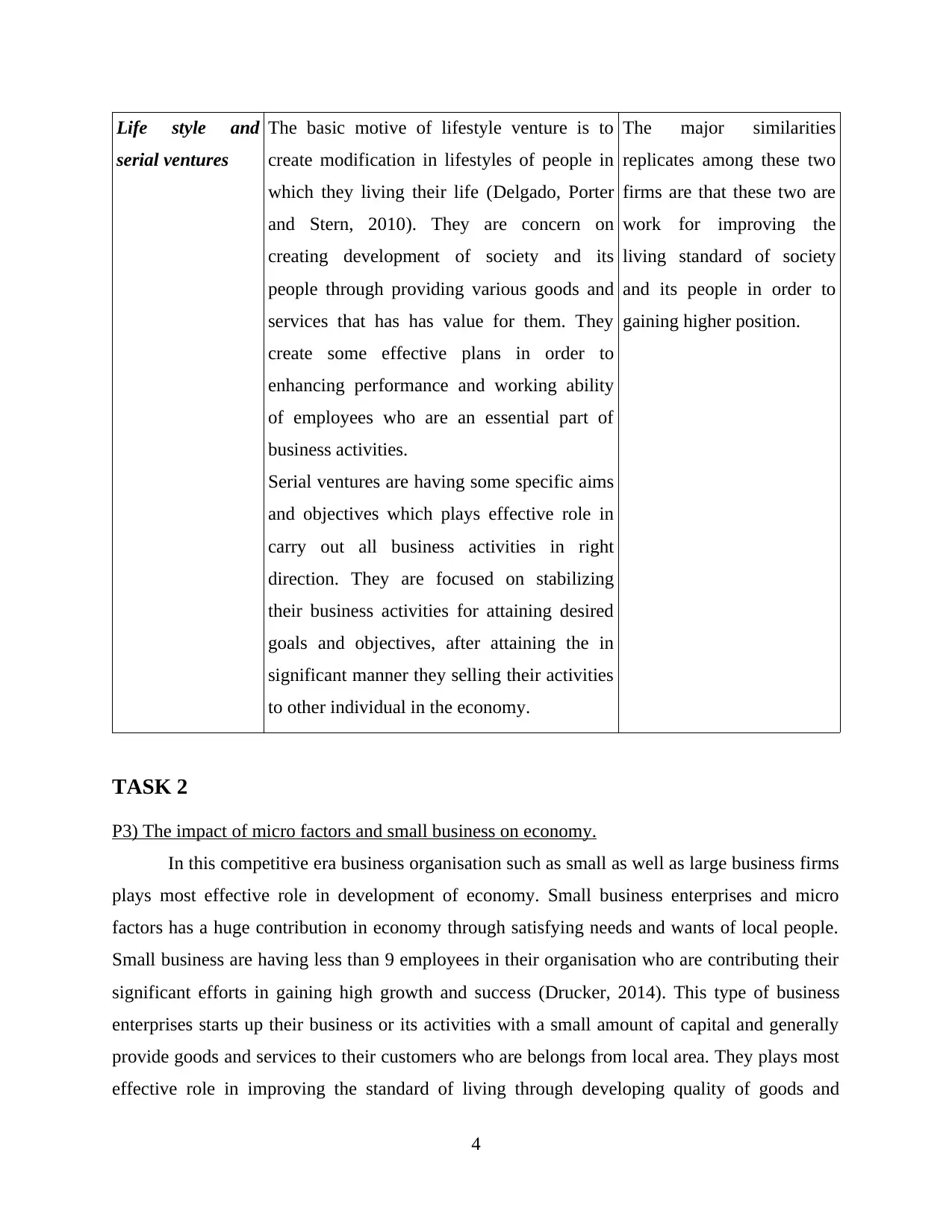
Life style and
serial ventures
The basic motive of lifestyle venture is to
create modification in lifestyles of people in
which they living their life (Delgado, Porter
and Stern, 2010). They are concern on
creating development of society and its
people through providing various goods and
services that has has value for them. They
create some effective plans in order to
enhancing performance and working ability
of employees who are an essential part of
business activities.
Serial ventures are having some specific aims
and objectives which plays effective role in
carry out all business activities in right
direction. They are focused on stabilizing
their business activities for attaining desired
goals and objectives, after attaining the in
significant manner they selling their activities
to other individual in the economy.
The major similarities
replicates among these two
firms are that these two are
work for improving the
living standard of society
and its people in order to
gaining higher position.
TASK 2
P3) The impact of micro factors and small business on economy.
In this competitive era business organisation such as small as well as large business firms
plays most effective role in development of economy. Small business enterprises and micro
factors has a huge contribution in economy through satisfying needs and wants of local people.
Small business are having less than 9 employees in their organisation who are contributing their
significant efforts in gaining high growth and success (Drucker, 2014). This type of business
enterprises starts up their business or its activities with a small amount of capital and generally
provide goods and services to their customers who are belongs from local area. They plays most
effective role in improving the standard of living through developing quality of goods and
4
serial ventures
The basic motive of lifestyle venture is to
create modification in lifestyles of people in
which they living their life (Delgado, Porter
and Stern, 2010). They are concern on
creating development of society and its
people through providing various goods and
services that has has value for them. They
create some effective plans in order to
enhancing performance and working ability
of employees who are an essential part of
business activities.
Serial ventures are having some specific aims
and objectives which plays effective role in
carry out all business activities in right
direction. They are focused on stabilizing
their business activities for attaining desired
goals and objectives, after attaining the in
significant manner they selling their activities
to other individual in the economy.
The major similarities
replicates among these two
firms are that these two are
work for improving the
living standard of society
and its people in order to
gaining higher position.
TASK 2
P3) The impact of micro factors and small business on economy.
In this competitive era business organisation such as small as well as large business firms
plays most effective role in development of economy. Small business enterprises and micro
factors has a huge contribution in economy through satisfying needs and wants of local people.
Small business are having less than 9 employees in their organisation who are contributing their
significant efforts in gaining high growth and success (Drucker, 2014). This type of business
enterprises starts up their business or its activities with a small amount of capital and generally
provide goods and services to their customers who are belongs from local area. They plays most
effective role in improving the standard of living through developing quality of goods and
4
Paraphrase This Document
Need a fresh take? Get an instant paraphrase of this document with our AI Paraphraser
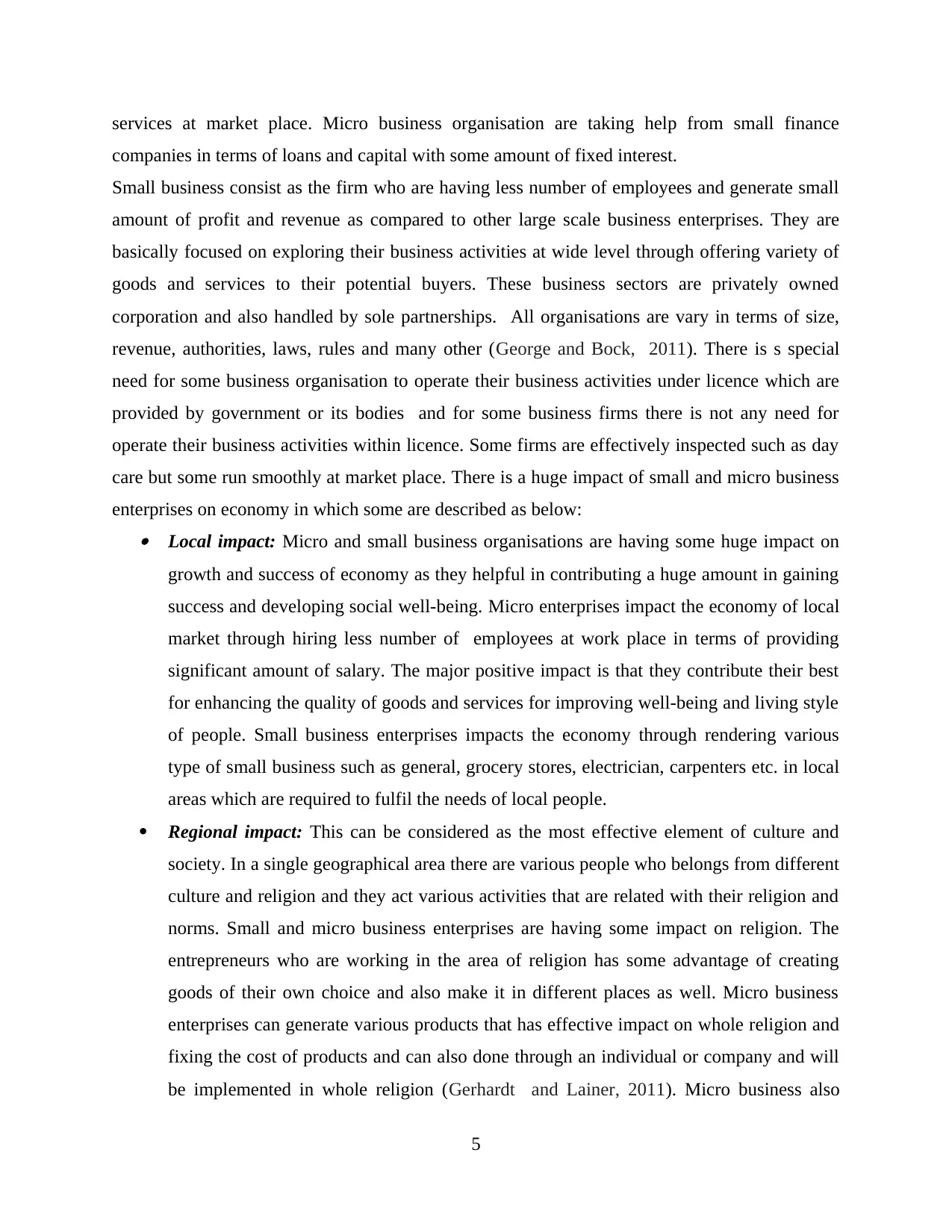
services at market place. Micro business organisation are taking help from small finance
companies in terms of loans and capital with some amount of fixed interest.
Small business consist as the firm who are having less number of employees and generate small
amount of profit and revenue as compared to other large scale business enterprises. They are
basically focused on exploring their business activities at wide level through offering variety of
goods and services to their potential buyers. These business sectors are privately owned
corporation and also handled by sole partnerships. All organisations are vary in terms of size,
revenue, authorities, laws, rules and many other (George and Bock, 2011). There is s special
need for some business organisation to operate their business activities under licence which are
provided by government or its bodies and for some business firms there is not any need for
operate their business activities within licence. Some firms are effectively inspected such as day
care but some run smoothly at market place. There is a huge impact of small and micro business
enterprises on economy in which some are described as below: Local impact: Micro and small business organisations are having some huge impact on
growth and success of economy as they helpful in contributing a huge amount in gaining
success and developing social well-being. Micro enterprises impact the economy of local
market through hiring less number of employees at work place in terms of providing
significant amount of salary. The major positive impact is that they contribute their best
for enhancing the quality of goods and services for improving well-being and living style
of people. Small business enterprises impacts the economy through rendering various
type of small business such as general, grocery stores, electrician, carpenters etc. in local
areas which are required to fulfil the needs of local people.
Regional impact: This can be considered as the most effective element of culture and
society. In a single geographical area there are various people who belongs from different
culture and religion and they act various activities that are related with their religion and
norms. Small and micro business enterprises are having some impact on religion. The
entrepreneurs who are working in the area of religion has some advantage of creating
goods of their own choice and also make it in different places as well. Micro business
enterprises can generate various products that has effective impact on whole religion and
fixing the cost of products and can also done through an individual or company and will
be implemented in whole religion (Gerhardt and Lainer, 2011). Micro business also
5
companies in terms of loans and capital with some amount of fixed interest.
Small business consist as the firm who are having less number of employees and generate small
amount of profit and revenue as compared to other large scale business enterprises. They are
basically focused on exploring their business activities at wide level through offering variety of
goods and services to their potential buyers. These business sectors are privately owned
corporation and also handled by sole partnerships. All organisations are vary in terms of size,
revenue, authorities, laws, rules and many other (George and Bock, 2011). There is s special
need for some business organisation to operate their business activities under licence which are
provided by government or its bodies and for some business firms there is not any need for
operate their business activities within licence. Some firms are effectively inspected such as day
care but some run smoothly at market place. There is a huge impact of small and micro business
enterprises on economy in which some are described as below: Local impact: Micro and small business organisations are having some huge impact on
growth and success of economy as they helpful in contributing a huge amount in gaining
success and developing social well-being. Micro enterprises impact the economy of local
market through hiring less number of employees at work place in terms of providing
significant amount of salary. The major positive impact is that they contribute their best
for enhancing the quality of goods and services for improving well-being and living style
of people. Small business enterprises impacts the economy through rendering various
type of small business such as general, grocery stores, electrician, carpenters etc. in local
areas which are required to fulfil the needs of local people.
Regional impact: This can be considered as the most effective element of culture and
society. In a single geographical area there are various people who belongs from different
culture and religion and they act various activities that are related with their religion and
norms. Small and micro business enterprises are having some impact on religion. The
entrepreneurs who are working in the area of religion has some advantage of creating
goods of their own choice and also make it in different places as well. Micro business
enterprises can generate various products that has effective impact on whole religion and
fixing the cost of products and can also done through an individual or company and will
be implemented in whole religion (Gerhardt and Lainer, 2011). Micro business also
5
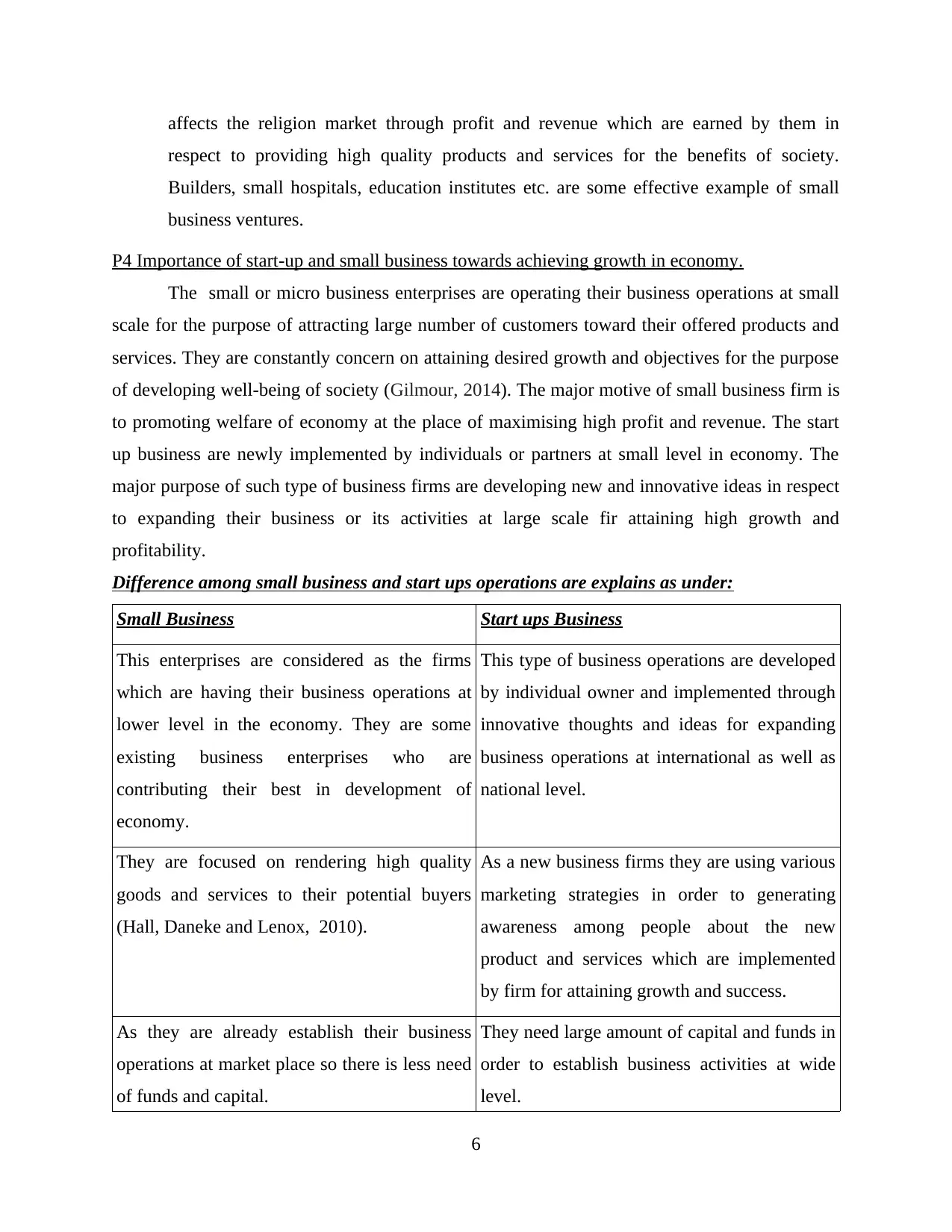
affects the religion market through profit and revenue which are earned by them in
respect to providing high quality products and services for the benefits of society.
Builders, small hospitals, education institutes etc. are some effective example of small
business ventures.
P4 Importance of start-up and small business towards achieving growth in economy.
The small or micro business enterprises are operating their business operations at small
scale for the purpose of attracting large number of customers toward their offered products and
services. They are constantly concern on attaining desired growth and objectives for the purpose
of developing well-being of society (Gilmour, 2014). The major motive of small business firm is
to promoting welfare of economy at the place of maximising high profit and revenue. The start
up business are newly implemented by individuals or partners at small level in economy. The
major purpose of such type of business firms are developing new and innovative ideas in respect
to expanding their business or its activities at large scale fir attaining high growth and
profitability.
Difference among small business and start ups operations are explains as under:
Small Business Start ups Business
This enterprises are considered as the firms
which are having their business operations at
lower level in the economy. They are some
existing business enterprises who are
contributing their best in development of
economy.
This type of business operations are developed
by individual owner and implemented through
innovative thoughts and ideas for expanding
business operations at international as well as
national level.
They are focused on rendering high quality
goods and services to their potential buyers
(Hall, Daneke and Lenox, 2010).
As a new business firms they are using various
marketing strategies in order to generating
awareness among people about the new
product and services which are implemented
by firm for attaining growth and success.
As they are already establish their business
operations at market place so there is less need
of funds and capital.
They need large amount of capital and funds in
order to establish business activities at wide
level.
6
respect to providing high quality products and services for the benefits of society.
Builders, small hospitals, education institutes etc. are some effective example of small
business ventures.
P4 Importance of start-up and small business towards achieving growth in economy.
The small or micro business enterprises are operating their business operations at small
scale for the purpose of attracting large number of customers toward their offered products and
services. They are constantly concern on attaining desired growth and objectives for the purpose
of developing well-being of society (Gilmour, 2014). The major motive of small business firm is
to promoting welfare of economy at the place of maximising high profit and revenue. The start
up business are newly implemented by individuals or partners at small level in economy. The
major purpose of such type of business firms are developing new and innovative ideas in respect
to expanding their business or its activities at large scale fir attaining high growth and
profitability.
Difference among small business and start ups operations are explains as under:
Small Business Start ups Business
This enterprises are considered as the firms
which are having their business operations at
lower level in the economy. They are some
existing business enterprises who are
contributing their best in development of
economy.
This type of business operations are developed
by individual owner and implemented through
innovative thoughts and ideas for expanding
business operations at international as well as
national level.
They are focused on rendering high quality
goods and services to their potential buyers
(Hall, Daneke and Lenox, 2010).
As a new business firms they are using various
marketing strategies in order to generating
awareness among people about the new
product and services which are implemented
by firm for attaining growth and success.
As they are already establish their business
operations at market place so there is less need
of funds and capital.
They need large amount of capital and funds in
order to establish business activities at wide
level.
6
⊘ This is a preview!⊘
Do you want full access?
Subscribe today to unlock all pages.

Trusted by 1+ million students worldwide
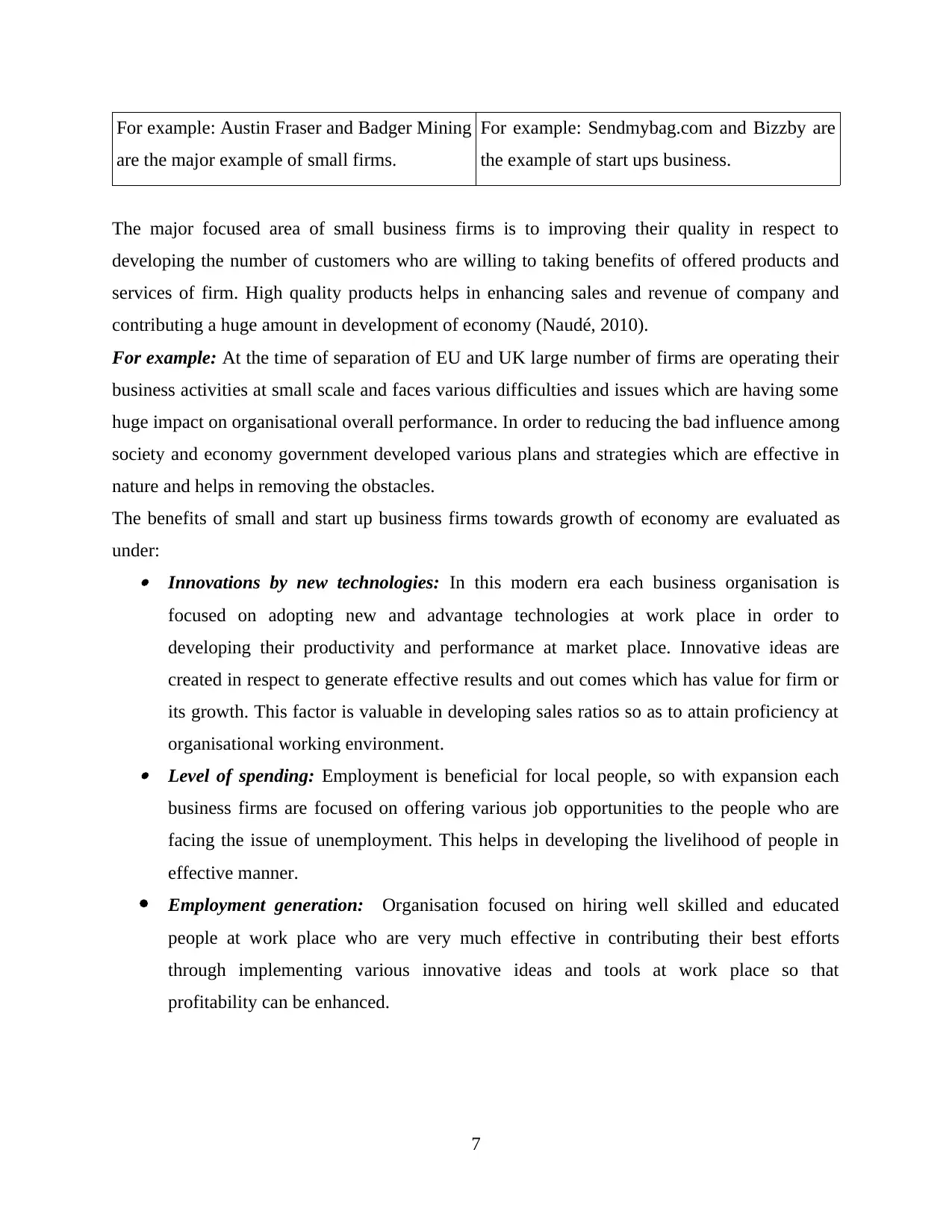
For example: Austin Fraser and Badger Mining
are the major example of small firms.
For example: Sendmybag.com and Bizzby are
the example of start ups business.
The major focused area of small business firms is to improving their quality in respect to
developing the number of customers who are willing to taking benefits of offered products and
services of firm. High quality products helps in enhancing sales and revenue of company and
contributing a huge amount in development of economy (Naudé, 2010).
For example: At the time of separation of EU and UK large number of firms are operating their
business activities at small scale and faces various difficulties and issues which are having some
huge impact on organisational overall performance. In order to reducing the bad influence among
society and economy government developed various plans and strategies which are effective in
nature and helps in removing the obstacles.
The benefits of small and start up business firms towards growth of economy are evaluated as
under: Innovations by new technologies: In this modern era each business organisation is
focused on adopting new and advantage technologies at work place in order to
developing their productivity and performance at market place. Innovative ideas are
created in respect to generate effective results and out comes which has value for firm or
its growth. This factor is valuable in developing sales ratios so as to attain proficiency at
organisational working environment. Level of spending: Employment is beneficial for local people, so with expansion each
business firms are focused on offering various job opportunities to the people who are
facing the issue of unemployment. This helps in developing the livelihood of people in
effective manner.
Employment generation: Organisation focused on hiring well skilled and educated
people at work place who are very much effective in contributing their best efforts
through implementing various innovative ideas and tools at work place so that
profitability can be enhanced.
7
are the major example of small firms.
For example: Sendmybag.com and Bizzby are
the example of start ups business.
The major focused area of small business firms is to improving their quality in respect to
developing the number of customers who are willing to taking benefits of offered products and
services of firm. High quality products helps in enhancing sales and revenue of company and
contributing a huge amount in development of economy (Naudé, 2010).
For example: At the time of separation of EU and UK large number of firms are operating their
business activities at small scale and faces various difficulties and issues which are having some
huge impact on organisational overall performance. In order to reducing the bad influence among
society and economy government developed various plans and strategies which are effective in
nature and helps in removing the obstacles.
The benefits of small and start up business firms towards growth of economy are evaluated as
under: Innovations by new technologies: In this modern era each business organisation is
focused on adopting new and advantage technologies at work place in order to
developing their productivity and performance at market place. Innovative ideas are
created in respect to generate effective results and out comes which has value for firm or
its growth. This factor is valuable in developing sales ratios so as to attain proficiency at
organisational working environment. Level of spending: Employment is beneficial for local people, so with expansion each
business firms are focused on offering various job opportunities to the people who are
facing the issue of unemployment. This helps in developing the livelihood of people in
effective manner.
Employment generation: Organisation focused on hiring well skilled and educated
people at work place who are very much effective in contributing their best efforts
through implementing various innovative ideas and tools at work place so that
profitability can be enhanced.
7
Paraphrase This Document
Need a fresh take? Get an instant paraphrase of this document with our AI Paraphraser
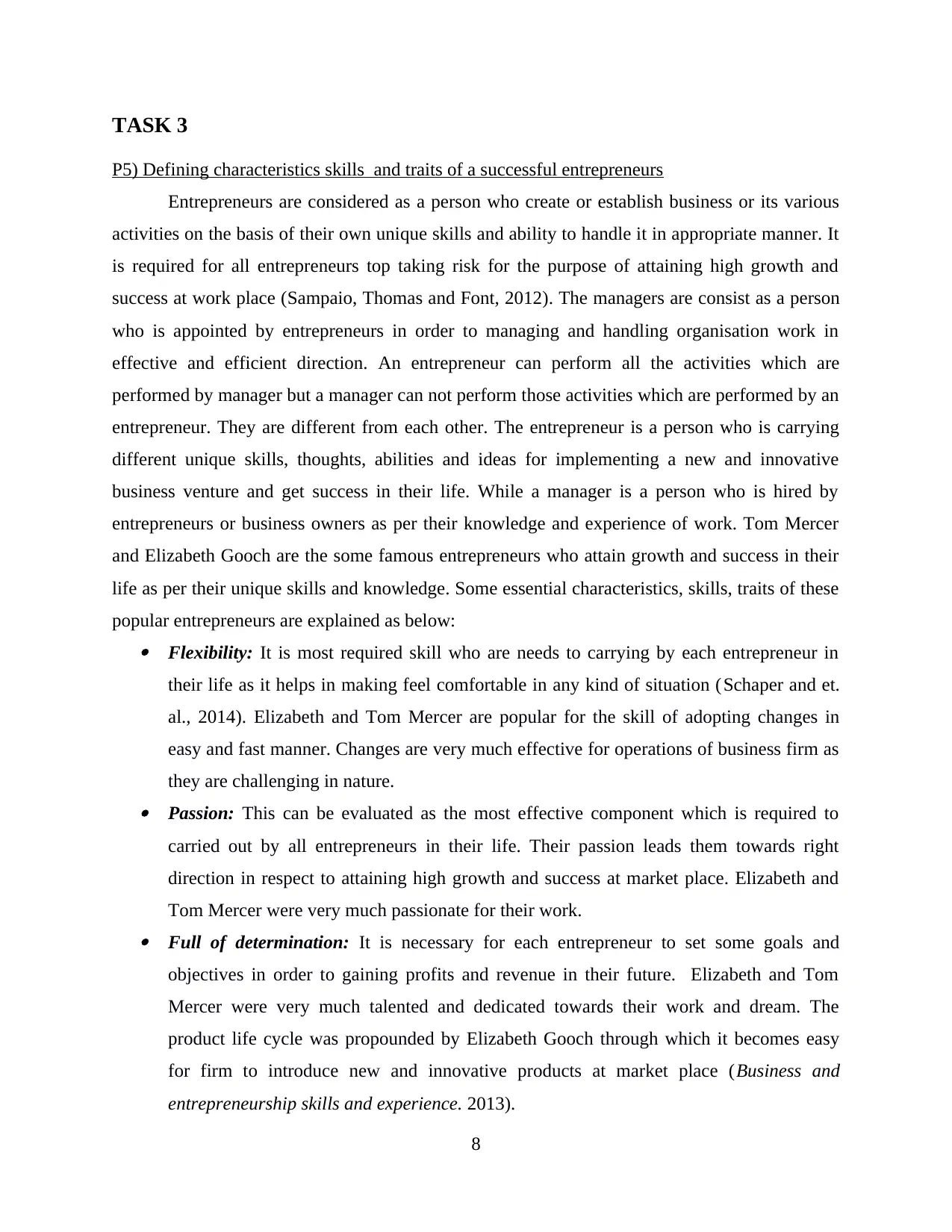
TASK 3
P5) Defining characteristics skills and traits of a successful entrepreneurs
Entrepreneurs are considered as a person who create or establish business or its various
activities on the basis of their own unique skills and ability to handle it in appropriate manner. It
is required for all entrepreneurs top taking risk for the purpose of attaining high growth and
success at work place (Sampaio, Thomas and Font, 2012). The managers are consist as a person
who is appointed by entrepreneurs in order to managing and handling organisation work in
effective and efficient direction. An entrepreneur can perform all the activities which are
performed by manager but a manager can not perform those activities which are performed by an
entrepreneur. They are different from each other. The entrepreneur is a person who is carrying
different unique skills, thoughts, abilities and ideas for implementing a new and innovative
business venture and get success in their life. While a manager is a person who is hired by
entrepreneurs or business owners as per their knowledge and experience of work. Tom Mercer
and Elizabeth Gooch are the some famous entrepreneurs who attain growth and success in their
life as per their unique skills and knowledge. Some essential characteristics, skills, traits of these
popular entrepreneurs are explained as below: Flexibility: It is most required skill who are needs to carrying by each entrepreneur in
their life as it helps in making feel comfortable in any kind of situation (Schaper and et.
al., 2014). Elizabeth and Tom Mercer are popular for the skill of adopting changes in
easy and fast manner. Changes are very much effective for operations of business firm as
they are challenging in nature. Passion: This can be evaluated as the most effective component which is required to
carried out by all entrepreneurs in their life. Their passion leads them towards right
direction in respect to attaining high growth and success at market place. Elizabeth and
Tom Mercer were very much passionate for their work. Full of determination: It is necessary for each entrepreneur to set some goals and
objectives in order to gaining profits and revenue in their future. Elizabeth and Tom
Mercer were very much talented and dedicated towards their work and dream. The
product life cycle was propounded by Elizabeth Gooch through which it becomes easy
for firm to introduce new and innovative products at market place (Business and
entrepreneurship skills and experience. 2013).
8
P5) Defining characteristics skills and traits of a successful entrepreneurs
Entrepreneurs are considered as a person who create or establish business or its various
activities on the basis of their own unique skills and ability to handle it in appropriate manner. It
is required for all entrepreneurs top taking risk for the purpose of attaining high growth and
success at work place (Sampaio, Thomas and Font, 2012). The managers are consist as a person
who is appointed by entrepreneurs in order to managing and handling organisation work in
effective and efficient direction. An entrepreneur can perform all the activities which are
performed by manager but a manager can not perform those activities which are performed by an
entrepreneur. They are different from each other. The entrepreneur is a person who is carrying
different unique skills, thoughts, abilities and ideas for implementing a new and innovative
business venture and get success in their life. While a manager is a person who is hired by
entrepreneurs or business owners as per their knowledge and experience of work. Tom Mercer
and Elizabeth Gooch are the some famous entrepreneurs who attain growth and success in their
life as per their unique skills and knowledge. Some essential characteristics, skills, traits of these
popular entrepreneurs are explained as below: Flexibility: It is most required skill who are needs to carrying by each entrepreneur in
their life as it helps in making feel comfortable in any kind of situation (Schaper and et.
al., 2014). Elizabeth and Tom Mercer are popular for the skill of adopting changes in
easy and fast manner. Changes are very much effective for operations of business firm as
they are challenging in nature. Passion: This can be evaluated as the most effective component which is required to
carried out by all entrepreneurs in their life. Their passion leads them towards right
direction in respect to attaining high growth and success at market place. Elizabeth and
Tom Mercer were very much passionate for their work. Full of determination: It is necessary for each entrepreneur to set some goals and
objectives in order to gaining profits and revenue in their future. Elizabeth and Tom
Mercer were very much talented and dedicated towards their work and dream. The
product life cycle was propounded by Elizabeth Gooch through which it becomes easy
for firm to introduce new and innovative products at market place (Business and
entrepreneurship skills and experience. 2013).
8
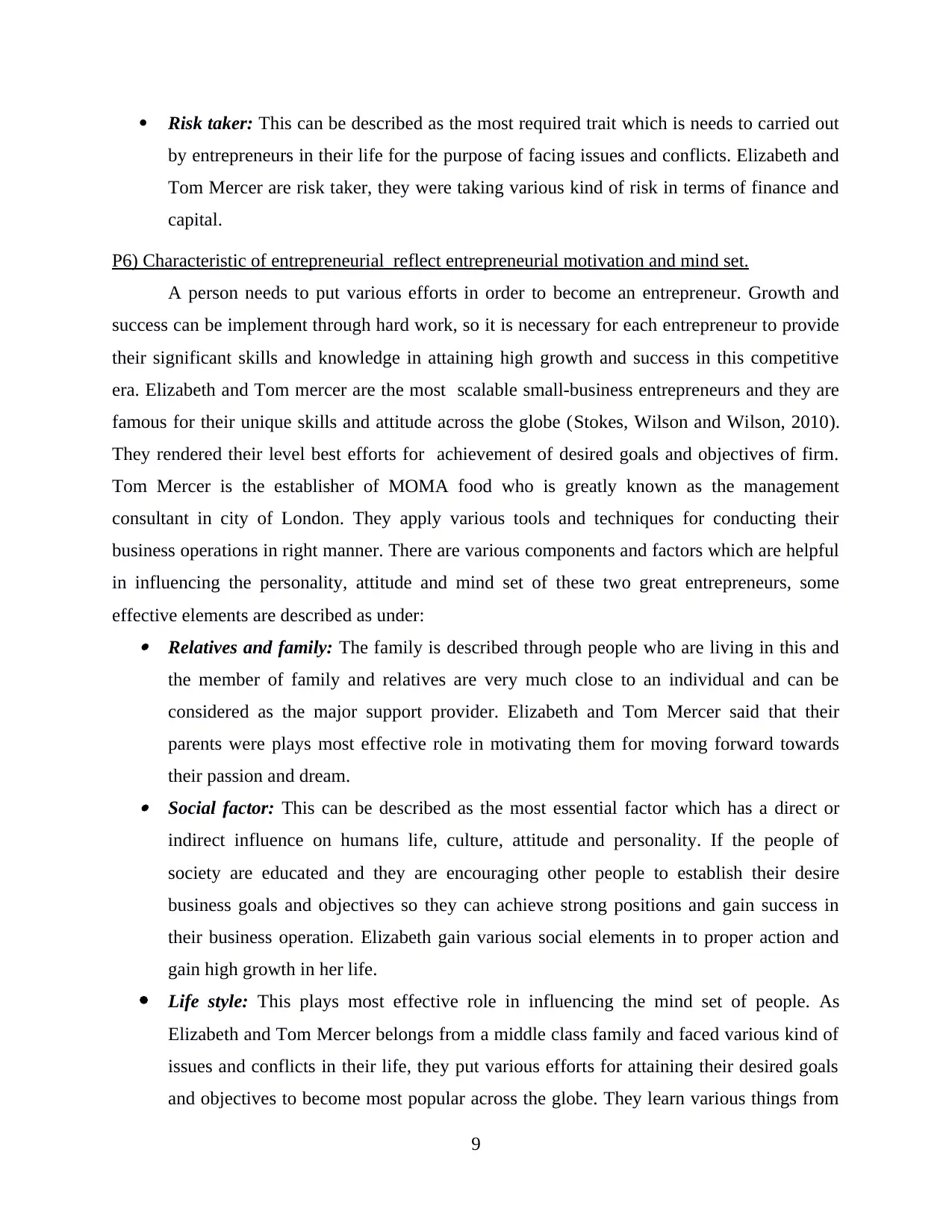
Risk taker: This can be described as the most required trait which is needs to carried out
by entrepreneurs in their life for the purpose of facing issues and conflicts. Elizabeth and
Tom Mercer are risk taker, they were taking various kind of risk in terms of finance and
capital.
P6) Characteristic of entrepreneurial reflect entrepreneurial motivation and mind set.
A person needs to put various efforts in order to become an entrepreneur. Growth and
success can be implement through hard work, so it is necessary for each entrepreneur to provide
their significant skills and knowledge in attaining high growth and success in this competitive
era. Elizabeth and Tom mercer are the most scalable small-business entrepreneurs and they are
famous for their unique skills and attitude across the globe (Stokes, Wilson and Wilson, 2010).
They rendered their level best efforts for achievement of desired goals and objectives of firm.
Tom Mercer is the establisher of MOMA food who is greatly known as the management
consultant in city of London. They apply various tools and techniques for conducting their
business operations in right manner. There are various components and factors which are helpful
in influencing the personality, attitude and mind set of these two great entrepreneurs, some
effective elements are described as under: Relatives and family: The family is described through people who are living in this and
the member of family and relatives are very much close to an individual and can be
considered as the major support provider. Elizabeth and Tom Mercer said that their
parents were plays most effective role in motivating them for moving forward towards
their passion and dream. Social factor: This can be described as the most essential factor which has a direct or
indirect influence on humans life, culture, attitude and personality. If the people of
society are educated and they are encouraging other people to establish their desire
business goals and objectives so they can achieve strong positions and gain success in
their business operation. Elizabeth gain various social elements in to proper action and
gain high growth in her life.
Life style: This plays most effective role in influencing the mind set of people. As
Elizabeth and Tom Mercer belongs from a middle class family and faced various kind of
issues and conflicts in their life, they put various efforts for attaining their desired goals
and objectives to become most popular across the globe. They learn various things from
9
by entrepreneurs in their life for the purpose of facing issues and conflicts. Elizabeth and
Tom Mercer are risk taker, they were taking various kind of risk in terms of finance and
capital.
P6) Characteristic of entrepreneurial reflect entrepreneurial motivation and mind set.
A person needs to put various efforts in order to become an entrepreneur. Growth and
success can be implement through hard work, so it is necessary for each entrepreneur to provide
their significant skills and knowledge in attaining high growth and success in this competitive
era. Elizabeth and Tom mercer are the most scalable small-business entrepreneurs and they are
famous for their unique skills and attitude across the globe (Stokes, Wilson and Wilson, 2010).
They rendered their level best efforts for achievement of desired goals and objectives of firm.
Tom Mercer is the establisher of MOMA food who is greatly known as the management
consultant in city of London. They apply various tools and techniques for conducting their
business operations in right manner. There are various components and factors which are helpful
in influencing the personality, attitude and mind set of these two great entrepreneurs, some
effective elements are described as under: Relatives and family: The family is described through people who are living in this and
the member of family and relatives are very much close to an individual and can be
considered as the major support provider. Elizabeth and Tom Mercer said that their
parents were plays most effective role in motivating them for moving forward towards
their passion and dream. Social factor: This can be described as the most essential factor which has a direct or
indirect influence on humans life, culture, attitude and personality. If the people of
society are educated and they are encouraging other people to establish their desire
business goals and objectives so they can achieve strong positions and gain success in
their business operation. Elizabeth gain various social elements in to proper action and
gain high growth in her life.
Life style: This plays most effective role in influencing the mind set of people. As
Elizabeth and Tom Mercer belongs from a middle class family and faced various kind of
issues and conflicts in their life, they put various efforts for attaining their desired goals
and objectives to become most popular across the globe. They learn various things from
9
⊘ This is a preview!⊘
Do you want full access?
Subscribe today to unlock all pages.

Trusted by 1+ million students worldwide
1 out of 16
Related Documents
Your All-in-One AI-Powered Toolkit for Academic Success.
+13062052269
info@desklib.com
Available 24*7 on WhatsApp / Email
![[object Object]](/_next/static/media/star-bottom.7253800d.svg)
Unlock your academic potential
Copyright © 2020–2025 A2Z Services. All Rights Reserved. Developed and managed by ZUCOL.





